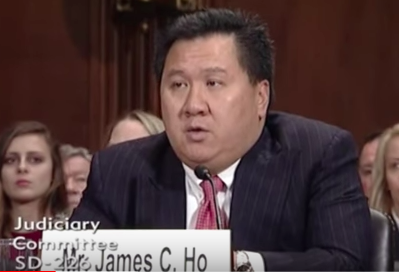Judge Ho Indulges In Furious Rage Wank Over AEA Deportations
Judicial onanism at its finest. The post Judge Ho Indulges In Furious Rage Wank Over AEA Deportations appeared first on Above the Law.


Yesterday, Judge James Ho had what can only be described as a public tantrum on the public docket. That’s not exactly out of character for the most intemperate jurist on the Fifth (and most intemperate) Circuit. But in a novel twist, this time he was screaming directly at the Supreme Court for daring to overturn his verdict to afford “special treatment … to certain favored litigants like members of Tren de Aragua.” Indirectly, he was screaming at the White House, in hopes that the president will think of him fondly when and if a vacancy opens up at the Supreme Court.
The excuse for these histrionics was one of the many lawsuits spawned by President Trump’s invocation of the Alien Enemies Act (AEA) on the theory that the government of Venezuela is invading the US, with street gangs acting as shock troops. This theory has been refuted not once but twice by the president’s own intelligence agencies, leading to a vow to prosecute leakers, but no change in strategy.
After SCOTUS decreed that detainees could only challenge AEA deportations in habeas, judges in Colorado, New York, and the Southern and Western Districts of Texas issued relief, barring DHS from summarily deporting men to a hellish gulag in El Salvador. But the government lucked out in the Northern District of Texas with Judge James Hendrix, a Trump appointee who refused to certify the detainees as a class or even to order the government to comply with the Supreme Court’s order that “notice must be afforded within a reasonable time and in such a manner as will allow them to actually seek habeas relief in the proper venue before such removal occurs.” The government’s position is that notice provided in English, less than 24 hours before removal, with no mention of how the detainee might challenge the deportation is plenty good enough.
Matters came to a head on the weekend of April 18 when the government, having gotten tacit permission from Judge Hendrix, began handing out these inadequate notices to prisoners at the Bluebonnet Detention Center, informing detainees that they would shortly be renditioned to El Salvador. The ACLU raced into court at 12:34 a.m. Friday morning with an emergency motion for TRO, which Judge Hendrix ignored. Twelve hours later, the plaintiffs asked the court to rule by 1:30 p.m., preventing the imminent departure of their clients beyond the court’s reach, or at least giving them something to appeal to the Fifth Circuit or SCOTUS. Still nothing.
Deeming this a constructive denial, they appealed anyway. The Fifth Circuit gave them the back of the hand, scolding the plaintiffs for casting aspersions on “the diligence and ability of the respected district judge in this case to act expeditiously when circumstances warrant.” At 1:30 a.m. on Saturday the 19th, the Supreme Court leapt in with a per curiam order directing the government “not to remove any member of the putative class of detainees from the United States until further order of this Court.” Two days later, Justice Alito released a howling dissent, joined by Justice Thomas, agreeing with Judge Hendrix that there could be no class certification in habeas and adopting the Fifth Circuit panel’s framing of the plaintiffs’ motion as giving Judge Hendrix just 42 minutes to respond, rather than more than 14 hours.
On May 16, the Supreme Court issued another per curiam order rubbishing the Fifth Circuit’s reasoning and noting that of course Judge Hendrix’s dithering even as detainees were being loaded onto buses amounted to a constructive denial.
The Court found that the government’s notice clearly did not provide due process to the detainees: “Under these circumstances, notice roughly 24 hours before removal, devoid of information about how to exercise due process rights to contest that removal, surely does not pass muster.”
The order barred deportations from the Northern District under the AEA, ruling that “we need not decide whether a class should be certified as to the detainees’ due process claims in order to temporarily enjoin the Government from removing putative class members while the question of what notice is due is adjudicated.”
Once again, Justices Alito and Thomas voiced their vehement dissent.
The case is now GVR-ed to the Fifth Circuit with the instruction to “address (1) all the normal preliminary injunction factors, including likelihood of success on the merits, as to the named plaintiffs’ underlying habeas claims that the AEA does not authorize their removal pursuant to the President’s March 14, 2025, Proclamation, and (2) the issue of what notice is due, as to the putative class’s due process claims against summary removal.”
And that’s how this case wound up back on Judge Ho’s (presumably spittle flecked) desk.
“It is not the role of the judiciary to check the excesses of the other branches, any more than it’s our role to check the excesses of any other American citizen,” he wrote, seemingly so overcome by phlegm that he forgot that his IRL job — and one that he pursued vigorously between 2021 and 2024! — is to serve as a check on the legislative and executive branches. Maybe one of his clerks can play him the School House Rock video to jog his memory!
“I write to state my sincere concerns about how the district judge as well as the President and other officials have been treated in this case,” he wrote, seemingly overcome with agita over the government’s inability to immediately cast human beings who have committed no crime into indefinite detention in an infamously dangerous prison. “I worry that the disrespect they have been shown will not inspire continued respect for the judiciary, without which we cannot long function.”
Judge Ho indulged in an extended lecture on CLOCKS, HOW DO THEY WORK, insisting that poor, overworked Judge Hendrix was only given 42 minutes to respond to the impudent plaintiffs.
“We seem to have forgotten that this is a district court—not a Denny’s,” he huffed indignantly. “This is the first time I’ve ever heard anyone suggest that district judges have a duty to check their dockets at all hours of the night, just in case a party decides to file a motion.”
The judge went on to insist on the sacred right of the government to take 24 hours to respond to any motion, during which time they could moot it by removing all members of the class from the district. And then, perhaps cognizant of the president’s short attention span, Judge Ho finished by heaping scorn on both Barack Obama and Bill Clinton.
And then, having released his judicial fluids, he pulled his robe back over his knees.
“The Supreme Court has reversed our unanimous judgment,” he sighed. “So this appeal must now proceed. I accordingly concur.”
He concurs … with the order to expedite the case as directed by the Supreme Court.
SUBTLE.
Liz Dye lives in Baltimore where she produces the Law and Chaos substack and podcast.
The post Judge Ho Indulges In Furious Rage Wank Over AEA Deportations appeared first on Above the Law.
























































































![The F-35’s future: The power and cooling competition that could change everything [Video]](https://breakingdefense.com/wp-content/uploads/sites/3/2024/09/240924_F35_moon_USAF-scaled-e1727200160419.jpg?#)
































































